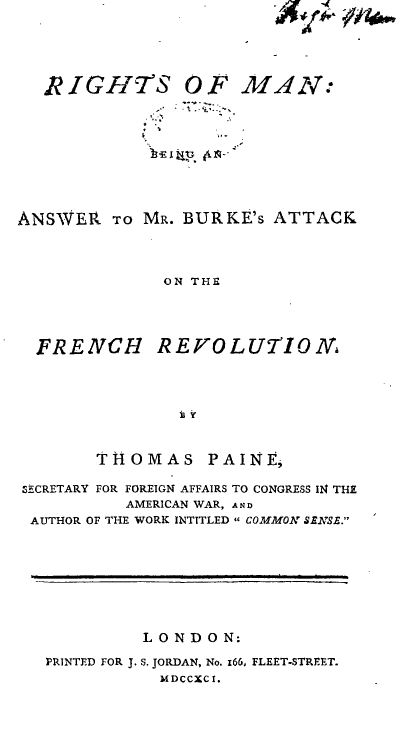TOM PAINE
Thomas Paine was a Norfolk man, born in 1737 to a Quaker father and a lawyer’s daughter. He learned his father’s trade – corset-making – but he was a restless individual and so tried a variety of other work: at one time or another he was a sailor, a craftsman, a schoolteacher and a tax collector. His father’s Quaker faith inspired Tom’s humanitarian beliefs. He was also deeply interested in Isaac Newton’s scientific theories, based on natural laws: he began to see how human society could be organised on ‘natural’ lines. In London he met up with parliamentary reformers.
He also met Benjamin Franklin, who was working in London as a journalist and wrote Tom a letter of introduction to take to America. Tom, now in his late 30s, sailed there in 1774 and soon became famous for his radical political ideas, which caught the imagination and enthusiasm of Americans, then struggling to become independent from their British colonisers. Tom Paine became an inspiration to the revolutionaries.
Tom Paine was no pacifist, so why is he of interest? For a start, he was a dedicated promoter of human rights and a resister against oppression. His political ideals were attractive, too: he described the misery of the peoples of Europe – ‘the Old World’ – explaining that such misery was caused not only by oppression and exploitation but also by war. He envisaged a world in which citizens would rise above selfish interests, for the good of the whole community. His idea of equality meant an end to personal wealth as well as equal rights in law. He was a lifelong and compassionate supporter of the poor: who still make up the great majority world wide today. While in America he also worked to bring about the abolition of slavery.
Tom Paine lived at a time when soldiers were part of the domestic landscape – rather as the police are in civil communities today, and sometimes with the same function. Few people could imagine a society without them or without weapons. It’s true that Quakers called for peaceful ways of dealing with conflict – and of bringing about political revolution. But immediate reality in the 1770s meant that revolutionary action was suppressed by British military, and nobody yet knew how to carry out a policy of non-violence to resist them. Tom Paine himself did not think it through.
In fact, long-term policy making was not in his nature – and there are still plenty of people like him who for a time exert political influence and catch the enthusiasm of the discontented. When the French revolution began, Tom went to France to take part. A friend who knew him well also saw him clearly. ‘I find him more fit, as it were, to scatter the kindling sparks than to lay the foundation or prepare the formation of a government. He is better at lighting the way for revolution than drafting a constitution.’ (In fact he was appalled by the Reign of Terror. He fell foul of Robespierre because he offered to arrange asylum for the French king in America, and was sent to prison.)
Tom Paine was also very good at writing political pamphlets. Among the most famous is ‘The Rights of Man’, published in two parts in 1791 and 1792. In it he outlines an inspirational economic system: a first draft for what would centuries later be called a welfare state – but stressing the responsibility of every single citizen to take responsible part in it. He believed (something everyone ought to be able to believe) that all kinds of benevolent reforms are possible.
the most famous is ‘The Rights of Man’, published in two parts in 1791 and 1792. In it he outlines an inspirational economic system: a first draft for what would centuries later be called a welfare state – but stressing the responsibility of every single citizen to take responsible part in it. He believed (something everyone ought to be able to believe) that all kinds of benevolent reforms are possible.
He also took a wider view: ‘The intrigue of courts, by which the system of war is kept up, may provoke a Confederation of Nations to abolish it; and a European Congress to patronise the progress of free government and promote the civilisation of nations with each other is an event nearer in probability than once were the revolutions of France and America.’
There they were, in Paine’s head: the United Nations and the European Union, both entrusted with the creation and maintenance of peace. What would he say to them today? There’s no doubt he would condemn (as he did in his lifetime) the way the world’s nations have invested so heavily in armaments than in (as he put it) ‘agriculture, commerce, manufactures and the tranquil arts, by which the prosperity of a nation is best promoted’.
read | download text of The Rights of Man
 the most famous is ‘The Rights of Man’, published in two parts in 1791 and 1792. In it he outlines an inspirational economic system: a first draft for what would centuries later be called a welfare state – but stressing the responsibility of every single citizen to take responsible part in it. He believed (something everyone ought to be able to believe) that all kinds of benevolent reforms are possible.
the most famous is ‘The Rights of Man’, published in two parts in 1791 and 1792. In it he outlines an inspirational economic system: a first draft for what would centuries later be called a welfare state – but stressing the responsibility of every single citizen to take responsible part in it. He believed (something everyone ought to be able to believe) that all kinds of benevolent reforms are possible.